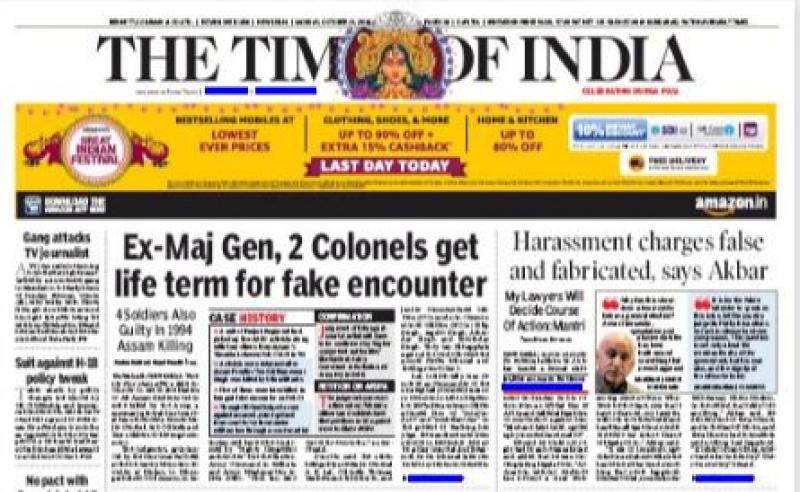 Twenty-four years after a fake encounter in which five leaders of All Assam Students Union were killed by the Army, a summary general court martial has sentenced a former Major General, two Colonels and four soldiers to life imprisonment.
Twenty-four years after a fake encounter in which five leaders of All Assam Students Union were killed by the Army, a summary general court martial has sentenced a former Major General, two Colonels and four soldiers to life imprisonment.
The judgment, pronounced by the court martial held at the 2 Infantry Mountain Division at Dinjan, in Dibrugarh district of Assam, on Saturday, will have to be confirmed by “higher competent authorities” like the Eastern Army Command in Kolkata and Army Headquarters in New Delhi. “This can take confirmation Judgment two to three months,” a source said.
Sources said the seven held guilty are Major General AK Lal, Colonels Thomas Mathew and R S Sibiren, and junior commissioned officers (JCOs) and non-commissioned officers (NCOs) Dilip Singh, Jagdeo Singh, Albindar Singh and Shivendar Singh. They can file appeals against the verdict before the armed forces tribunal and the Supreme Court.
Lal, incidentally, was removed as commander of the strategically located 3 Infantry Division in Leh in September 2007 after a woman officer accused him of “misconduct” and “misbehaviour” on the pretext of teaching her yoga. He was dismissed from service in December 2010 after a court martial, but the armed forces tribunal later restored his retirement benefits.
Dibrugarh: The wait was 24 years long. But when an Army court martial sentenced seven Army personnel to life imprisonment for a fake encounter in which five All Assam Students’ Union (Aasu) leaders were killed, it gave their families a sense of closure.
The harrowing memories, however, won’t go away. “It was 10.30 am on February 17, 1994. Four armed soldiers and a civilian came to our house. They took my husband away. I never saw him again,” recalls Lileswari Moran, widow of Bhaben Moran, one of the five Aasu leaders killed by the Army. Lileswari was 28 at the time.
Bhaben was “taken” by soldiers of the Dhola-based 18 Punjab Regiment with four others – Prabin Sonowal, Pradip Dutta, Debajit Biswas and Akhil Sonowal — all from the Dangari area at Doomdooma in Tinsukia district and then killed at DibruSaikhowa National Park.
His widow, Lileswari, now 52, has found some solace in the verdict. “Families of the others killed in the fake encounter also feel vindicated. But I personally think the guilty deserve death by hanging,” Lileswari says. She adds, “They killed innocent men in cold blood ... My husband was an innocent man. We were struggling to make ends meet and the Army personnel just took him away, labelled him an Ulfa terrorist and shot him dead.”
For Aasu, too, it was a battle won at long last. After the verdict, Aasu members, led by organising secretary Dipankar Sonowal and family members, held a shradhanjali programme for the five Aasu leaders at the Pancha Swahid Memorial situated at Dangari. The memorial was set up in memory of the five youths who were later declared ‘swahids’ (martyrs) by Aasu. “We are happy that the guilty personnel have been awarded life sentence. We have been fighting for this cause for 24 years,” Aasu leader Dipankar Sonowal says.
The long wait has not been easy on the families of the victims. “After my husband died, I had to take over all responsibilities. My in-laws were old, I had five young children but did not have a job,” Lileswari says.
That was when Jagdish Bhuyan, then AGP leader, stepped in. It was Bhuyan’s petition seeking an investigation into the killings that led to a CBI investigation and, finally, the court martial. “Jagdish Bhuyan got me a temporary job as a peon at the Saikhowa block development office at a salary of Rs 900. Recently it was increased to Rs 5,500,” Lileswari said.
But it is not quite enough. “My job is temporary. It would be good if my job is made permanent,” she adds. Her eldest son Arnab Moran, too, hails the decision, but says there should be compensation for the families and a deterrent mechanism to prevent such cases in the future.
The new court martial verdict revolves around the extra-judicial killing of AASU activists Prabin Sonowal, Pradip Dutta, Debajit Biswas, Akhil Sonowal and Bhaben Moran after a unit of the Punjab Regiment had picked them up along with four others from different places in Tinsukia between February 17 and 19 in 1994.
The Army had detained the nine at the Dholla Army Camp after the general manager of Assam Frontier Tea Limited at Talap Tea Estate, Rameswar Singh, was killed by Ulfa militants. Five of them were later killed in the infamous Dangari fake encounter case on February 23. The then AASU vice-president and now BJP leader in the state Jagadish Bhuyan had fought for justice single-handedly in the Guwahati high court, which led to a CBI probe in the case. Chief minister Sarbananda Sonowal was AASU president at that time.
Though the CBI had also lodged a case against accused soldiers after recording statements of the survivors and other witnesses, the Army had obtained permission from the court to try them under military law through a court martial.
“The seven men have been dismissed from service and sentenced to life imprisonment. For 24 years, I have never once lost faith in Indian democracy, Indian judiciary and the Indian Army. The Army has given exemplary punishment to its own officers and men on finding them guilty and this has amplified the glory of the Army and increased people’s trust in the Army,” Bhuyan said.
The landmark judgment comes at a time when almost 750 Army officers and soldiers have filed petitions in the Sc against any move to dilute the iron-fisted Armed Forces Special Powers Act (AFSPA), which gives military personnel special rights and immunity to operate in ‘disturbed areas’ like J&K and the northeast.
Army chief General Bipin Rawat, on his part, has said the force will stand firmly with all its soldiers who operate and conduct bonafide counter-insurgency operations in Kashmir and the northeast but will deal sternly with cases of wrongdoing, aberrations and moral turpitude.
The Army argues the AFSPA, first enacted by Parliament in 1958 to tackle insurgency in the northeast, is an “enabling Act” that provides “operational flexibility and protection” to military personnel operating in “extremely hostile environments” against terrorists and other inimical forces. But human rights activists have called for abrogation of the AFSPA, or making it “more humane” and less open to misuse at the very least.
 Leads Of The World
Leads Of The World
31046 hour(s) 24 minute(s) ago ;
Morning 09:19 ; Thursday ; May 02, 2024
The Times of IndiaEx-Maj Gen, 2 Colonels get life term for fake encounter
Send
Bangla Tribune Desk
Published : 17:49, Oct 15, 2018 | Updated : 17:52, Oct 15, 2018
Published : 17:49, Oct 15, 2018 | Updated : 17:52, Oct 15, 2018
0 ...0 ...
/hb/
Topics: Top Stories
- KOICA donates medical supplies to BSMMU
- 5 more flights to take back British nationals to London
- Covid19: Rajarbagh, Mohammadpur worst affected
- Momen joins UN solidarity song over COVID-19 combat
- Covid-19: OIC to hold special meeting
- WFP begins food distribution in Cox’s Bazar
- WFP begins food distribution in Cox’s Bazar
- 290 return home to Australia
- Third charter flight for US citizens to return home
- Dhaka proposes to postpone D8 Summit
Unauthorized use of news, image, information, etc published by Bangla Tribune is punishable by copyright law. Appropriate legal steps will be taken by the management against any person or body that infringes those laws.
Bangla Tribune is one of the most revered online newspapers in Bangladesh, due to its reputation of neutral coverage and incisive analysis.
F R Tower, 8/C Panthapath, Shukrabad, Dhaka-1207 | Phone: 58151324; 58151326, Fax: 58151329 | Mob: 01730794527, 01730794528


